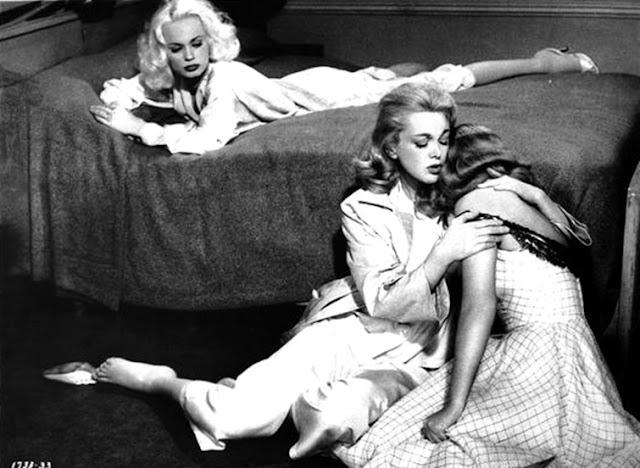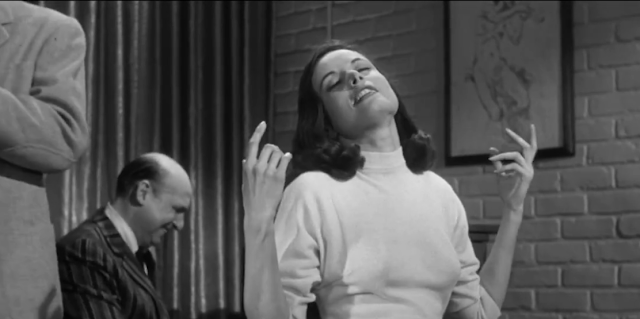 |
| "Honey, get your boppin' shoes, Before the jukebox blow the fuse, Everybody's hoppin', Everybody's boppin', Boppin' at the high school hop." |
Before Johnny Depp took on the role of an undercover cop in a high school in TV's 21 Jump Street, Russ Tamblyn from West Side Story made the first wave in the cult classic B-film High School Confidential! (1958). He plays a new student at Santa Bellow High, but he’s an undercover narcotics agent working with the police to take down “Mr. A,” a jazz pianist and drug dealer played by Jackie Coogan, who is famously known as Uncle Fester.
The film starts with Jerry Lee Lewis belting out the title track from a flatbed truck.
 | |||||||||||
| "The name's Baker. B-A-K-E-R, and I park where I want." |
Shocking the office clerk played by Helen Kleeb.
 |
| "You know, if you were 20 years younger, even then, I'd hate to be stuck with you on a date.' |
"You know for a 'teach' you're pretty cool. Why don't we cut out and go to your pad and live it up, huh?"
"Now, one swingin' day while Chris was sittin' at the beach, goofin', he dug that the world was round. And with this crazy idea stashed in his lid, he swung over to the royal pad to cut up a few touches with a cool chick, Queen Isabella, who was a swinger."
Michael Landon, fresh off his role in I Was a Teenage Werewolf (1957), takes on the character of Steve Bentley, the captain of the football team, The Rangers, who makes his introduction to Baker.
 |
| Steve: "Hi, I'm Steve Bentley. Tony "That's too bad." |
He’s living with Gwen Dulaine, a sultry sex kitten (Mamie Van Doren), who’s pretending to be his aunt and guardian while her husband is away. She’s constantly seeking his attention and makes secret attempts to seduce him.
"If you flake around with the weed, you'll end up using the harder stuff".
So believes the police commissioner In a gathering with the principal and teachers. He displays marijuana cigarettes and explains the slang associated with them (“Let’s turn on!”), stressing the harmful nature of drugs. They are convinced that marijuana is the gateway to a slippery slope that can lead to serious addiction issues.
Baker gets close to J.I. and finds out that the school has Mary Jany users.
 |
| "I'm lookin' to graze on some grass. |
I had so much fun watching this movie, especially since it shares my birthday, June 13. As a big fan of 1950s exploitation teen films, I can’t believe I didn’t discover this hidden gem sooner. It’s delightfully cheesy and wonderfully captures the spirit of the era. The slang alone is worth the viewing experience, not to mention the thrilling fight scene, lively pool party, jalopy drag race, and the Coogan hangout with beatnik poetry performance by Phillipa Fallon.
On my B-Movie-o meter, it scores a average B.
I was a bit puzzled about Van Doren's role, but it's probably best not to dig too deep into Mamie Van Doren's character and simply enjoy her performance. Let's just say she knows how to set the screen on fire. The character of Tony Baker presents a significant flaw for me; he makes his ulterior motives glaringly obvious. His approach is far too intense. I'm more critical of Tamblyn's casting in this part. In West Side Story, he convincingly embodied the Jets' leader, radiating charisma and authority. Yet, in this film, I couldn't shake the feeling that another actor could have delivered a more compelling presence. Adding to the annoyance is his portrayal of an irritating punk. It seems Tamblyn wasn't fully engaged, perhaps feeling trapped in a B movie after his recent Academy Award nomination for Peyton Place. He was puzzled by High School Confidential's cult following, dismissing it as a trivial film, and he felt Peyton Place deserved more acclaim. Both he and Van Doren were left scratching their heads about the nature of their scenes together.
Tamblyn: "To tell you the truth, I hated it at the time. My agent and I both thought the script was terrible, and he tried to get me out of it, but the studio threatened suspension if I didn't do the picture... And no one has ever figured out what Mamie Doren's character was. She's my aunt? It was weird."
Doren: It was my first movie with MGM. I met the leading man Russ Tamblyn, I met him the same morning I had a kissing scene with him. It's not easy to walk into a scene early in the morning just from bed and you walk in and you've got this very passionate sexy scene with your nephew. Supposedly he was my nephew in the movie. I don't know who was looking at the movie and let that go by."
The film went through several title changes. "Crazy Mixed-Up Kids," "The Texas Joe Foster," "Teen-Age Project," "Co-Ed Jungle," "Juvenile Jungle," and, finally, "High School Confidential!"
When the film first hit the screens, it didn't receive a warm welcome from everyone. Critics were quick to pounce on the use of slang, with some outright rejecting it as a poorly crafted effort. Despite the mixed reviews, this black-and-white CinemaScope feature turned out to be a box office sensation, raking in close to $2 million from a modest budget of around $6,000. The film's success was significantly bolstered by the record-breaking popularity of its title track, performed by Jerry Lee Lewis.
In 1963, the film was rebranded as The Young Hellions, and by 1965, it was a familiar sight on local television across the United States. The mid-1970s saw it become a midnight movie classic on 42nd Street in New York City and at the Nuart Theater in Los Angeles. The 1980s brought its release on videotape, and in 2004, was released on DVD.









%20-%20Movie%20stills%20and%20photos_%20-%20www.moviestillsdb.com.png)


















1 comment:
I have had this film in my collection for years and never checked it out. I will have to remedy that! Thanks for the reminder!
Post a Comment